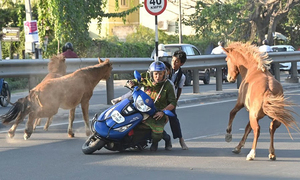유럽 3위 경제대국 건설 멀어져
 작년 여름 소위 “아랍의 봄”이 한창 진행 중일 때 터키 총리 레제프 타이이프 에르도안 정부는 상승세를 탔다. 워싱턴 정치권은 이슬람 민주주의의 “터키 모델”이 이슬람 민주주의의 각종 장점을 갖고 있으며 중동과 북아프리카 국가들의 길잡이가 터키 모델이라고 찬양했다.
작년 여름 소위 “아랍의 봄”이 한창 진행 중일 때 터키 총리 레제프 타이이프 에르도안 정부는 상승세를 탔다. 워싱턴 정치권은 이슬람 민주주의의 “터키 모델”이 이슬람 민주주의의 각종 장점을 갖고 있으며 중동과 북아프리카 국가들의 길잡이가 터키 모델이라고 찬양했다.
터키의 외무장관 아흐메트 다부토을루는 여러 국제회의에서 자국을 지역 지도자로 선전하는 기회를 제공받았다. 에르도안 자신은 저명한 퓨 연구소가 실시한 여론조사에서 중동의 가장 인기 높은 지도자로 판정받았다. 대략 10년 전 집권에 성공한 이후 지정학적인 강자를 꿈꾸어 온 정의개발당을 이끄는 에르도안 일당은 전성기를 맞았다.
지난 1년 동안 큰 변화가 나타났다. 현재 국내에서 계속되는 반정부 시위와 해외의 커지는 반대에 직면한 터키 집권자들은 궁지에 몰렸다.
터키가 현재 당면한 곤경의 표면적인 원인은 이스탄불의 탁심 상업지구에 있는 작은 공원이다. 이 공원의 개발이 정부와 반대자들 사이에 충돌을 일으킨 도화선이 되었다. 물론 이 공원이 이번 소요사태의 진정한 원인은 아니다. 소요사태의 실질적인 원인은, 최근 몇 년 동안 점점 무책임하고 독재적으로 변한 에르도안에 대한 국민들의 분노가 폭발한 데 있다.
그런 정책 가운데는, 강력한 터키 군부를 상대로 벌인 마녀사냥 행위와 이미 정부에 순종하는 언론의 독립을 더욱 약화시킨 것이 포함된다. 항의시위에 대한 에르도안의 대응 또한 상황을 크게 악화시켰다. 사회불안을 숨기기 위해 언론을 무분별하게 탄압하고 시위자들에게 최루가스를 쏘는 강압전술이 대대적인 국민의 분노를 촉발하여 시위를 더욱 확산시켰다.
시위사태 이후 에르도안 정권이 취한 일련의 조치 가운데는 이웃사람들이 서로 경찰에 밀고하는 투서함을 설치하는 것이 포함되었다. 이런 조치는 점점 독재로 흘러가는 터키 정권을 새롭게 조명하는 계기를 마련했다. 또한 터키가 이슬람 민주주의의 모범이며 아랍의 봄을 겪은 국가들이 따라야 할 성숙한 모범이라는 국제사회의 견해가 이런 조치로 인해서 퇴색한 것이 더욱 중요하다.
오바마 행정부도 터키를 모범으로 치켜세웠다. 터키의 정의개발당과 당수인 에르도안을 “믿을 수 있는 친구”라고 오바마 대통령이 열렬히 치켜세운 것이 불과 얼마 전 일이었다. 게지 공원 항의사태 이후 백악관은 터키에 관해 일절 입을 다물고 있다. 이스라엘과 팔레스타인의 평화회담 재개, 미국의 시리아 내전 개입 등 터키와 밀접한 관계가 있는 여러 가지 현안 해결을 위한 워싱턴의 노력에 비추어볼 때 백악관의 이런 침묵은 시사하는 바가 크다.
터키의 정치적 영향력은 중동 안에서도 곤두박질하고 있다. 과거 중동의 인기스타로 찬양받았던 에르도안은 분열을 조장하는 인물로 논란의 대상이 되었고 터키에 대한 주변의 신망은 큰 타격을 받았다.
이 모든 상황이 터키의 경제계획에 먹구름을 드리우고 있다. 최근 터키는 경제적으로 상당한 성과를 거두었다. 특히 경제가 부진한 주변의 유럽연합 회원국들에 비해 그랬다. 터키는 유럽에서 경제 규모가 6위에 도달했고 세계적으로는 16위다. 터키 정부는 경제성장을 통해 2050년까지 유럽의 제3위 경제대국으로 성장하고 세계에서 10위의 경제를 건설할 계획이다. 이 계획은 정의개발당에 대한 신뢰와 국제사회의 투자를 바탕으로 삼고 있다.
그러나 이런 희망은 게지 공원 시위사태 이전의 일이다. 즉 아랍 및 서방 사회에서 터키에 대한 민심이반이 일어나기 전의 전망이다. 그 결과 터키 경제의 미래는 갑자기 극도로 어두워지고 있다. 그와 더불어 터키가 지역 정치의 지도자가 될 가능성도 희미해졌다.
대신 갈수록 많은 나라들이 희망사항이 아닌 터키의 진면목을 마침내 보게 되었다. 그 점에서 국제사회는 에르도안에게 감사해야 한다.
일란 버먼 美 외교정책협회 부회장
워싱턴타임스·정리=오성환 외신전문위원
Epitaph for the Turkish model
By Ilan Berman
Last summer, when the so-called "Arab Spring" was in full bloom, the government of Recep Tayyip Erdogan in Turkey was riding high.
Within the Washington Beltway, policy studies extolled the virtues of the "Turkish model" of Islamic democracy as a guidepost for the countries of the Middle East and North Africa. Turkey's grandiose foreign minister, Ahmet Davotoglu, was given high-profile international venues at which to champion the idea of Turkey as a natural regional leader. Mr. Erdogan himself was judged to be the most popular leader in the Middle East in a poll conducted by the prestigious Pew Research Center. It was a heady time for Mr. Erdogan and company, whose Justice and Development Party (AKP) has aspired to geopolitical greatness since its ascent to power roughly a decade ago.
What a difference a year can make. Fast-forward just 12 months, and Turkey's rulers find themselves under siege, facing persistent protests at home and growing disapproval abroad.
The proximate cause of Turkey's current troubles was a small, nondescript park in Istanbul's commercial neighborhood of Taksim, which became a flash point between the government and its opponents. The park, known as Gezi, was not the real cause for the unrest, of course. As my colleague Claire Berlinski has convincingly detailed, the disorder really stems from popular outrage over Mr. Erdogan's increasingly unaccountable, authoritarian policies in recent years, which have included a veritable witch hunt against the country's powerful military and systematic efforts to further trim the independence of the already subservient national media.
Mr. Erdogan's response to the protests has made matters much, much worse. Heavy-handed tactics, from the gassing of protesters to the harassment of journalists with enough temerity to cover the unrest, drew massive popular outrage in Turkey and prompted still more protests. Steps adopted since by Mr. Erdogan's government - such as the installation of "informant boxes" allowing Turkish citizens to inform on their neighbors to police - have only served to shed new light on the country's continuing authoritarian drift. More significant still, these moves have soured international observers on the idea of Turkey as a paragon of Islamic democracy, or as a mature example for the "Arab Spring" states to follow.
Prominent among them has been the Obama administration. Not all that long ago, President Obama was waxing enthusiastic about Turkey's AKP and its leader, Mr. Erdogan, whom he termed a "trusted friend." Not so now. Since the Gezi protests, the White House has remained studiously silent about all matters Turkish. Given Washington's current efforts on issues near and dear to Ankara - from renewed peace talks between Israel and the Palestinians to involvement in the Syrian civil war - that silence speaks volumes.
In the Middle East, too, Turkey's political clout is plummeting. Previously hailed as a "rock star" by regional audiences, Mr. Erdogan has become a controversial and divisive figure, while the appeal of Turkey as a whole has taken a distinct hit.
All of this casts a pall over Ankara's economic plans. The country has enjoyed considerable economic success of late, especially as compared with its sluggish European neighbors. Growing gross domestic product ($786 billion in 2012), a relatively modest budget deficit (2 percent), and comparatively low unemployment and public debt (9.4 percent and 37 percent, respectively) have already made Turkey the sixth-largest economy in Europe, and the 16th-largest in the world. Turkish officials have even bigger plans; by 2050, they hope, their country will rank as the third-largest economy in Europe, and 10th in the world overall, thanks to confidence in the AKP and investment from the international community.
That, however, was before Gezi, and before the popular turn-away from Ankara that is now taking place in both the Arab world and in the West. As a result, Turkey's economic future is suddenly exceedingly cloudy. So, too, are its once-promising chances for regional political leadership. Instead, more and more countries are beginning at long last to see Turkey as it truly is, rather than as they have wished it would be.
For that, we have Mr. Erdogan to thank.
By Ilan Berman
Last summer, when the so-called "Arab Spring" was in full bloom, the government of Recep Tayyip Erdogan in Turkey was riding high.
Within the Washington Beltway, policy studies extolled the virtues of the "Turkish model" of Islamic democracy as a guidepost for the countries of the Middle East and North Africa. Turkey's grandiose foreign minister, Ahmet Davotoglu, was given high-profile international venues at which to champion the idea of Turkey as a natural regional leader. Mr. Erdogan himself was judged to be the most popular leader in the Middle East in a poll conducted by the prestigious Pew Research Center. It was a heady time for Mr. Erdogan and company, whose Justice and Development Party (AKP) has aspired to geopolitical greatness since its ascent to power roughly a decade ago.
What a difference a year can make. Fast-forward just 12 months, and Turkey's rulers find themselves under siege, facing persistent protests at home and growing disapproval abroad.
The proximate cause of Turkey's current troubles was a small, nondescript park in Istanbul's commercial neighborhood of Taksim, which became a flash point between the government and its opponents. The park, known as Gezi, was not the real cause for the unrest, of course. As my colleague Claire Berlinski has convincingly detailed, the disorder really stems from popular outrage over Mr. Erdogan's increasingly unaccountable, authoritarian policies in recent years, which have included a veritable witch hunt against the country's powerful military and systematic efforts to further trim the independence of the already subservient national media.
Mr. Erdogan's response to the protests has made matters much, much worse. Heavy-handed tactics, from the gassing of protesters to the harassment of journalists with enough temerity to cover the unrest, drew massive popular outrage in Turkey and prompted still more protests. Steps adopted since by Mr. Erdogan's government - such as the installation of "informant boxes" allowing Turkish citizens to inform on their neighbors to police - have only served to shed new light on the country's continuing authoritarian drift. More significant still, these moves have soured international observers on the idea of Turkey as a paragon of Islamic democracy, or as a mature example for the "Arab Spring" states to follow.
Prominent among them has been the Obama administration. Not all that long ago, President Obama was waxing enthusiastic about Turkey's AKP and its leader, Mr. Erdogan, whom he termed a "trusted friend." Not so now. Since the Gezi protests, the White House has remained studiously silent about all matters Turkish. Given Washington's current efforts on issues near and dear to Ankara - from renewed peace talks between Israel and the Palestinians to involvement in the Syrian civil war - that silence speaks volumes.
In the Middle East, too, Turkey's political clout is plummeting. Previously hailed as a "rock star" by regional audiences, Mr. Erdogan has become a controversial and divisive figure, while the appeal of Turkey as a whole has taken a distinct hit.
All of this casts a pall over Ankara's economic plans. The country has enjoyed considerable economic success of late, especially as compared with its sluggish European neighbors. Growing gross domestic product ($786 billion in 2012), a relatively modest budget deficit (2 percent), and comparatively low unemployment and public debt (9.4 percent and 37 percent, respectively) have already made Turkey the sixth-largest economy in Europe, and the 16th-largest in the world. Turkish officials have even bigger plans; by 2050, they hope, their country will rank as the third-largest economy in Europe, and 10th in the world overall, thanks to confidence in the AKP and investment from the international community.
That, however, was before Gezi, and before the popular turn-away from Ankara that is now taking place in both the Arab world and in the West. As a result, Turkey's economic future is suddenly exceedingly cloudy. So, too, are its once-promising chances for regional political leadership. Instead, more and more countries are beginning at long last to see Turkey as it truly is, rather than as they have wished it would be.
For that, we have Mr. Erdogan to thank.
Copyright ⓒ 세계일보. 무단 전재 및 재배포 금지
![[설왕설래] 한·일 여권 없는 왕래](http://img.segye.com/content/image/2025/12/18/128/20251218518473.jpg
)
![[기자가만난세상] ‘강제 노역’ 서술 빠진 사도광산](http://img.segye.com/content/image/2025/12/18/128/20251218518441.jpg
)
![[세계와우리] 사라진 비핵화, 자강만이 살길이다](http://img.segye.com/content/image/2025/12/18/128/20251218518464.jpg
)
![[기후의 미래] 사라져야 새로워진다](http://img.segye.com/content/image/2025/12/18/128/20251218518446.jpg
)








